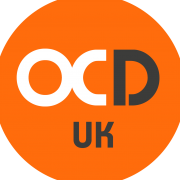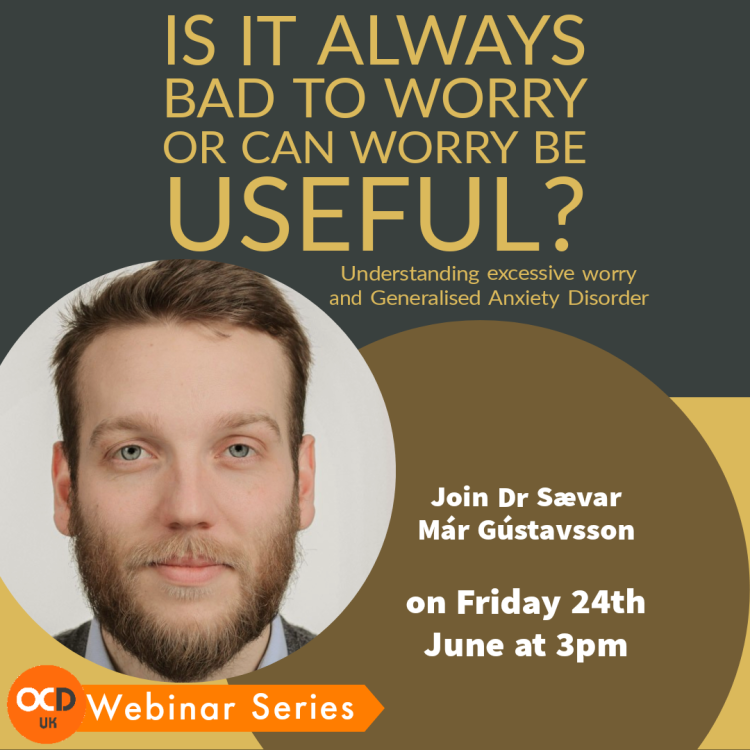-
Posts
369 -
Joined
-
Hi Thumula, I'm really sorry to hear how much your friend is struggling at the moment. Perhaps it would be helpful for her to listen to other people with OCD who have struggled with religious based worries and overcome them. There are two presentations from our 2020 conference that you could both watch here https://www.ocduk.org/conference/conferences-across-the-uk/2020-virtual/conference-map/main/ocd-and-religion-a-sufferers-perspective/ and here https://www.ocduk.org/conference/conferences-across-the-uk/2020-virtual/conference-map/main/ocd-faith-and-climate-change/ Maybe if she sees that she is not alone in her struggles, then she will feel more ready to reach out for help. Gemma
-

8 year old with OCD and food aversion
Gemma@OCDUK replied to Sarah Young's topic in Family, Friends and Carers (FFC)
Hi Sarah, I agree with Snowbear in that not being able to drink makes it a possible emergency situation so I hope you have managed to reach out to either your GP for immediate assistance or if you have to go to A&E, then please do so. It is really hard because I'm sure it feels like your total responsibility to get your daughter eating and drinking, but really you need support to tackle this problem, because it will be very distressing for you and your husband too. Gemma -

8 year old with OCD and food aversion
Gemma@OCDUK replied to Sarah Young's topic in Family, Friends and Carers (FFC)
Hi Sarah, I'm so sorry to hear how much your daughter is struggling at the moment. I understand how hard it must be to watch your daughter in such distress over something seemingly so simple like eating food. The symptoms you describe sound a lot like those with OCD with contamination fears around food, but there is another condition that I know of called Avoidant Restrictive Food Intake Disorder (ARFID) that can co-occur with OCD, or be a condition on its own. We have a presentation from the specialist CAMHS team in London talking about it here https://www.ocduk.org/conference/conferences-across-the-uk/2021-virtual/family/ocd-and-co-morbidities/ They do suggest some resources, but just knowing about ARFID might help better inform the approach of CAMHS. You mentioned that your daughter's therapist has contacted CAMHS and so has your GP, have you heard anything back yet? Gemma -

Ocd and relationships
Gemma@OCDUK replied to Dantheflan's topic in Obsessive-Compulsive Disorder (OCD)
Hi Dantheflan, It's hard to say whether or not these worries are because of OCD or not, however there are some things that these worries will have in common with OCD. Caring for someone means that you risk getting hurt, OCD hates risk, you can't know for 100% sure that everything will be fine in the future, OCD hates uncertainty. Whether or not it's OCD doesn't matter too much as long as you approach the worry over risk and uncertainty the same. Look out for what behaviours you do that say you need to constantly keep a look out for things going wrong, try your best to reduce them, and your feelings and concentration on them will reduce over time. Gemma -
Hi Shishkebab, Typically, local talking therapies services let your GP know that you are using the service, so you don't need to do it yourself. If the service is an Improving Access to Psychological Therapies (IAPT) service (which it sounds like it is), then the professionals there can't offer a diagnosis, but they are trained to assess people with common anxiety problems and will be able to recognise when someone is struggling with OCD. The aim for treatment for OCD is CBT, so as long as CBT is included in your treatment plan at some point then it sounds like they are taking the right steps for you Gemma
-
Hi Louloulou, If your son was improving with CAMHS, then is it possible to get back in touch with them about further CBT? Gemma
-

Waking up anxious
Gemma@OCDUK replied to Tough at times's topic in Obsessive-Compulsive Disorder (OCD)
Hi Tough at times I have heard lots of people say they wake up anxious so you are definitely not alone. The only way to lose anxiety like all other emotions is to accept that it is there and to get on with your day. Emotions come and go and won't last forever, as long as we don't buy into them (like trying to work out why you're anxious). Also, when you're anxious you're more likely to be irritable and get intrusive thoughts, so again accept this as part of anxiety and be compassionate with yourself Gemma -
Hi OB1UK, It might be helpful to look at this problem as if it was a friend's dilemma. What would you suggest they do in this situation? Do you think you are treating yourself which much harsher standards then you would suggest a friend did? At the moment it sounds like you are worried about the fact that you 'could' have acted in a different way. Why do feel thinking this over and over is going to help? Do you have evidence that thinking it over helps at all? My advice is to take things in small chunks. Practice for a half hour, not engaging with these thoughts, enjoying family time. Try this over a few days, allowing yourself other time to ruminate if you want to. Then after a few days extend it to 45 minutes and so on. Giving up thinking about all the thoughts at once may just be a little out of reach right now, but you can get there. Gemma
-
Moshy started following Gemma@OCDUK
-
Hi Ben, If your fiancé is in England, then she will be able to self-refer to her local IAPT service for Cognitive Behavioural Therapy (CBT). She can find her local service here https://www.nhs.uk/service-search/mental-health/find-a-psychological-therapies-service/ If she is elsewhere in the UK, then it's likely she will need to speak to her GP. She will need to ask for a referral to her local Community Mental Health Team (CMHT). If it would help, she can explain that she has been advised to seek CBT for OCD by OCD-UK. We have some fantastic conference presentations that you might find helpful to watch together. You can access them all here https://www.ocduk.org/conference/ Gemma
-

Therapist to help family
Gemma@OCDUK replied to CaringParent's topic in Family, Friends and Carers (FFC)
Hi CaringParent, I don't think I have heard of a therapist who could offer this type of support. Most of the time the focus would be on challenging the OCD, where sometimes families are included in the odd session, so they know how best to support the person struggling. Gemma -
Hi Ben, I'm really sorry to hear how much your fiancé is struggling at the moment. You mentioned that she has been to the doctors a few times, has she ever been offered or had any treatment? Treatment would include Cognitive Behavioural Therapy (CBT) and possibly SSRI medication. Gemma
-

Where do I go for help with 11yr old daughter?
Gemma@OCDUK replied to zjg22's topic in Family, Friends and Carers (FFC)
Hi zjg22, I'm sorry to hear that your daughter is struggling so much at the moment. You can access CBT on the NHS, but what service is best for your daughter depends on how old she is. if she is under 16 years old then she would need a referral to her local Child and Adolescent Mental Health Service (CAMHS) who will be able to assess, diagnose and offer treatment. We do have some fantastic presentations aimed at parents of children under 18 years old, that offer ideas on how to tackle OCD as a family. You can find them all here https://www.ocduk.org/conference/conferences-across-the-uk/2021-virtual/family/ and here https://www.ocduk.org/conference/conferences-across-the-uk/2020-virtual/conference-map/family/ Gemma -

A break from thinking about OCD
Gemma@OCDUK replied to CaringParent's topic in Family, Friends and Carers (FFC)
Hi CaringParent, We have a fantastic presentation aimed at parents of children under 18 years old (but could be still be relevant) that you might find helpful about parental self care https://www.ocduk.org/conference/conferences-across-the-uk/2021-virtual/family/parents-caring-for-themselves/ It features two parent's honest account of how they coped alongside OCD. Gemma -

OCD-UK Webinar Series
Gemma@OCDUK replied to Gemma@OCDUK's topic in Obsessive-Compulsive Disorder (OCD)
The next webinar in OCD-UK's webinar series is this one.... To register to watch live click here - https://www.ocduk.org/webinar-series/understanding-excessive-worry-and-gad/ Hope to see you there, Gemma -

National Specialist Services
Gemma@OCDUK replied to flourella's topic in Obsessive-Compulsive Disorder (OCD)
Hi Flourella, OHSPIC would very much tailor their treatment approach to your situation, so they wouldn't offer home visits until you were ready to. My understanding of the Springfield is what you referenced, that they can offer some outpatient support, again I imagine it will vary on a case by case basis. I don't know of any information on OCD treatment with the specific co-morbidities you mentioned. Treatment should really be individual so there won't be one approach for everyone even with the same difficulties. The benefit of specialists in OCD is that they will have worked with others who have experienced similar problems and will adapt their approach when it is needed. I also can't see why your health professionals will not be able to discuss the best options for you with the specialist clinics. It sounds like they are taking the right steps. Gemma


